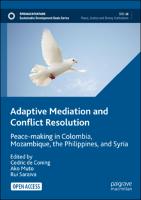Adaptive Mediation and Conflict Resolution
Peace-making in Colombia, Mozambique, the Philippines, and Syria
Contributor(s)
de Coning, Cedric (editor)
Muto, Ako (editor)
Saraiva, Rui (editor)
Language
EnglishAbstract
This open access book introduces adaptive mediation as an alternative approach that enables mediators to go beyond liberal peace mediation, or other determined-design models of mediation, in the context of contemporary conflict resolution and peace-making initiatives. Adaptive mediation is grounded in complexity theory, and is specifically designed to cope with highly dynamic conflict situations characterized by uncertainty and a lack of predictability. It is also a facilitated mediation process whereby the content of agreements emerges from the parties to the conflict themselves, informed by the context within which the conflict is situated. This book presents the core principles and practices of adaptive mediation in conjunction with empirical evidence from four diverse case studies – Colombia, Mozambique, The Philippines, and Syria – with a view to generate recommendations for how mediators can apply adaptive mediation approaches to resolve and transform contemporary and future armed conflicts.
Keywords
peacekeeping; peacebuilding; mediation in protracted conflicts; mediation and peacebuilding; mediation in Colombia; mediation in Syria; mediation in Mozambique; mediation in the Philippines; why international mediation fails; adaptive peacebuilding; adaptive mediation; peace-making; UN SDGs; SDG 16; sustainable development goalsDOI
10.1007/978-3-030-92577-2ISBN
9783030925772, 9783030925772Publisher
Springer NaturePublisher website
https://www.springernature.com/gp/products/booksPublication date and place
Cham, 2022Imprint
Palgrave MacmillanSeries
Sustainable Development Goals Series,Classification
International relations
Arbitration, mediation and alternative dispute resolution
Diplomacy


 Download
Download Web Shop
Web Shop